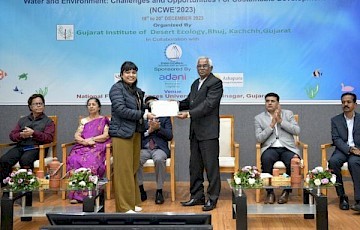24 October 2024
Professor Minal Pathak Co-authors Critical UNEP Report on Climate Change

The latest UNEP Emissions Gap Report is out, and it does not paint an encouraging picture. The Report, which is in its 15th year, offers an annual review of the emission targets and how far we are globally from achieving them in terms of limiting global warming to 1.5°C.
UNEP is the leading global voice on the environment. It provides leadership and encourages partnership in caring for the environment by inspiring, informing and enabling nations and peoples to improve their quality of life without compromising that of future generations.
The latest edition of the UNEP Report warns that continuation of the current policies across the world and failure to meet the climate commitments would lead to a catastrophic temperature rise of up to 3.1°C. Further, currently, even the commitments for 2030 seem unlikely to be achieved, and even if they are met, the temperature rise would still be limited to 2.6-2.8°C, way above the target of 1.5°C, leading to debilitating impacts for people, economies, and the entire planet. Antonio Guetteras, UN Secretary General, says, “We are teetering on a planetary tightrope. There is a direct link between increasing emissions and increasing and intense climate disasters.”
Thus, the Report highlights the gap between the temperature control objectives laid down by the Paris Agreement and Nationally Determined Contributions (NDCs) for mitigating the impact of climate change and controlling global emissions. “We are teetering on a planetary tightrope. There is a direct link between increasing emissions and increasing and intense climate disasters”, said the UN Secretary General, António Guterres, while launching the Report.
The findings of the Report foreground the forthcoming climate agenda, ahead of the UN Climate Conference in Baku, Azerbaijan, in November 2024, and the COP30 in Belem, Brazil, in November 2025, which will lay down a new round of countries’ NDCs.
Minal Pathak, Associate Professor and Academic Director of The Climate Institute at Ahmedabad University, who is one of the lead authors of the UNEP Emissions Gap Report 2024, underscores the criticality of the report as it highlights the urgency of action while also presenting opportunities that are available now. However, this will require unprecedented effort, political will, resource mobilisation, and international cooperation.
The Report outlines the imperative and various options for accelerating action on the climate agenda and aligning it with the temperature goals delineated in the Paris Agreement. All nations must collectively commit to cut 42 per cent off annual greenhouse gas emissions by 2030 and 57 per cent by 2035 in the next round of NDCs. This necessitates immediate action and a massive global mobilisation to cut greenhouse gas emissions to meet the 1.5°C goal.
The Report also looks at the potential pathways for limiting emissions, such as increased deployment of solar photovoltaic technologies and wind energy, action on forests, efficiency measures, electrification and fuel switching in the buildings, transport, and industry sectors. According to this potential, it is possible to meet the COP28 targets of tripling renewable energy capacity by 2030, doubling the global average annual rate of energy efficiency improvements by 2030, transitioning away from fossil fuels, and conserving, protecting, and restoring nature and ecosystems. Finally, the Report lays out how to ensure that the updated NDCs are well-designed, specific, and transparent so they can meet any new possible climate targets.
The Executive Director, UNEP, Inger Andersen offered a ray of hope when she asserted, “Controlling emissions is a gargantuan task that requires global mobilisation on a scale and a pace never seen before. But it does, at least for the moment, remain technically possible…. Every fraction (of a degree of temperature) matters in terms of lives saved, economies protected, damages avoided, biodiversity conserved, and the ability to bring down any temperature overshoot. So, I urge everyone, ‘No more hot air, please!’”



